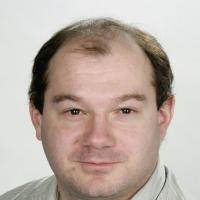Поруке: 33
Језик: English
Miland (Погледати профил) 27. јун 2007. 13.22.01
http://www.liberafolio.org/2005/Agado/miyoshiinter...
Mendacapote (Погледати профил) 27. јун 2007. 13.36.31
Well, as a physician I’m “overexposed” to the English pronunciation of a lot of chemical and drug names. About puns… it depends: if they are of sexual content I’m quite aware of the enormous creativity of the American pornographers… actually that’s one of my dark hobbies: the study of the porno-erotic filthy English vocabulary. How many times a day do you speak about trees? I could pass weeks without mentioning a tree at all! If 60% is enough for you, you are definitely too benign regarding language mastering.
erinja (Погледати профил) 27. јун 2007. 14.03.44
The number of members of national associations could possibly reach 30,000, so that does sound like a possible source of the number. Of course that doesn't mean that all of these people actually speak Esperanto; some people join just to show their support for the idea, not because they actually speak.
Mendacapote:
I think it is worth drawing a distinction between speaking a language and mastering it. I have met people who won't say that they "speak" a language unless they could teach a class in it. Perhaps you follow this definition. But as an example, my Italian is probably at a similar level as awake's Esperanto. I can have a conversation but my vocabulary is limited. I do fine with reading the newspaper, buying things in stores, fulfilling my basic needs. Not fluent by a long shot. But if asked if I speak Italian, it would seem silly to say "no", considering I have been able to host someone in my house and give a reasonably coherent tour of my city in a situation where the only common language was Italian. I certainly wouldn't say I've mastered it, not by a long shot, but it wouldn't seem unreasonable (to me) to say that I speak it.
And to me, being an "Esperantist" doesn't have any connotation whatsoever of speaking the language fluently. Esperant/ist/o - it means someone whose habitual hobby is Esperanto. I don't think anyone expects that a "biciklisto" will be a pro bicyclist; if you know how to ride a bike and you like to ride the bike frequently as a hobby, I think you can call yourself a "biciklisto", even if you're not very talented. You can be an "artisto" if you like to make art often and habitually, even if you're a terrible artist, likewise with "skribisto". If you spend a lot of time writing, and it's your hobby or profession, then you're a "skribisto", whether you're good at it or not.
Honestly I think awake should call himself an Esperantist with no problem. The Esperanto definition of "Esperantist" at the lernu dictionary says "someone who speaks Esperanto (and would like more people to speak it)". That sounds like a good description to me (I am assuming that awake wants more people to speak it).
Miland (Погледати профил) 27. јун 2007. 16.11.31
EL_NEBULOSO (Погледати профил) 27. јун 2007. 17.15.43
you are absolutely correct!
When I read the response from erinja,I figured she was talking about something else...
This thread really "grew" quickly since yesterday, so obviously there is quite some interest in the topic.
Gerald
Mendacapote (Погледати профил) 27. јун 2007. 20.09.17
By the way, I do love biking... but I objectively prefer to call myself: “biciklemulo” instead of “biciklisto”.
Maybe we should be called: esperantemuloj... I mean, to avoid the isto connotation.

mnlg (Погледати профил) 27. јун 2007. 22.20.42
erinja (Погледати профил) 28. јун 2007. 01.03.21
I see this as a completely separate issue from what language level you need to reach before calling yourself an "Esperantist".
Miland (Погледати профил) 28. јун 2007. 13.58.20
All this suggests to me that to get a film industry you need the amenities and population of a large city, with 1 million people or more. It is also evidence for the number of fluent speakers of Esperanto being less than the 1.6 million that Culbert predicted - for at that level we might expect at least half a dozen films by now. Still, we've had 3 full length ones (with two surviving) and one half-length one on the way, not too bad.
mnlg (Погледати профил) 28. јун 2007. 14.07.59
Miland:But now three interesting figures, which may well be influenced by something mnlg referred to, of special help for groupsOf course it makes sense for me. For film-making you need resources, perhaps a contiguous minority in a defined community, as a potential market, to justify the costs (DVD-oriented production might sidestep this, though).
Perhaps another indicator could be used: the amount of literary work. How many books are published each year in Maori or Breton? How many for Esperanto? I'm not sure how easily these figures can be retrieved. With even more detail, we could compare according to original work and translations.



